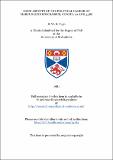Files in this item
Some aspects of the political career of Marcus Licinius Crassus, consul 70 and 55BC
Item metadata
| dc.contributor.author | Pugh, David William Drummond | |
| dc.coverage.spatial | 286 p. | en_US |
| dc.date.accessioned | 2018-07-10T13:10:41Z | |
| dc.date.available | 2018-07-10T13:10:41Z | |
| dc.date.issued | 1981 | |
| dc.identifier.uri | https://hdl.handle.net/10023/15184 | |
| dc.description.abstract | Ch. I A discrepancy exists in the ancient sources between the record of Crassus' activities and assessments of his importance. Some possible reasons are considered. Ch. II Crassus' birth date is placed between late June -115 and very early 114. Absent from Rome between 81 and 82, Crassus entered the senate in about 81. He was praetor in 75 or 74, was prosecuted for incest in 73, and was therefore a privatus when given the command against Spartacus. His political position in the 70s is considered. Ch. III In 70 Crassus was concerned in the restoration of the tribunicia potestas, as he shows connections with several tribunes of the 70s. His breach with Pompey may concern the actions of the censors of 70. Crassus was interested in the reform of the courts, though probably friendly to Verres. Ch. IV Crassus may have been hostile to both Lucullus and Pompey in the early 60s, Cn.Piso prosecuted Manilius in 66/5, and was sent to Spain to facilitate a change of prosecutor. Catiline was involved against Manilius. Ch. V In 65 Crassus aimed to enfranchise the Transpadani in order to increase his power in the comitia. He was also concerned to annexe Egypt, frustrated by Catulus, he considered an alliance with Pompey, and began to cooperate with Caesar. Ch. VI Catiline's supposed Pompeian ties are unconvincing. Crassus supported. Catiline and Antonius. In 63 Cicero allied himself with the optimates, frustrated Crassus' tribunician programme, and tried to destroy his political credibility by virtually creating the Catilinarian "conspiracy". Ch. VII Pompey had hoped to return with his army. He then tried to ally himself with Cato, and dropped several former associates, one of whom, P.Clodius, was helped by Crassus. Crassus joined the optimates to ensure Pompey's frustration. The First Triumvirate ensued. Ch. VIII In April 59 Pompey and Caesar tried to drop Crassus, who managed, through his association with Clodius, to prevent this. The Vettius affair may have been genuine. The tribunician elections were held in October. Ch. IX Having failed to crush Pompey through Clodius, Crassus, with Caesar's help, forced him to a crisis from which he himself would emerge the strongest. Provincial commands were decided at Luca; the second consulship was not. Ch. X Most of the measures passed' in 55 were not politically significant. Crassus, more committed to the alliance, now incurred hostility. Though away in 54 he kept in touch, and may have been involved in the electoral scandal of that year. Ch. XI Crassus' style belied his great ambitions. The nature of his power necessitated an approach different from that of Pompey. His strategy for securing supreme power is considered. The political realignment that followed his death led inevitably to Civil War. Appendix A Crassus married the widow of a brother who died by 91. Publius, his elder son, married Scipio's daughter probably in 55. Marcus married Caecilia Metella in 70 or 69. Appendix B Plutarch's figure for Crassus' total wealth is too low. Pompey and Crassus were both very rich. Crassus had interests in the South of Italy, and derived his wealth from Spanish silver mines, housing, and slaves. Appendix C Cicero's Sixth Stoic Paradox may have existed before all six were published together in 46, Plutarch thought it a speech, and associated it with Crassus' trial for incest in 73. | en_US |
| dc.language.iso | en | en_US |
| dc.subject.lcc | DG260.C73P9 | en |
| dc.subject.lcsh | Crassus, Marcus Licinius | en |
| dc.title | Some aspects of the political career of Marcus Licinius Crassus, consul 70 and 55BC | en_US |
| dc.type | Thesis | en_US |
| dc.type.qualificationlevel | Doctoral | en_US |
| dc.type.qualificationname | PhD Doctor of Philosophy | en_US |
| dc.publisher.institution | The University of St Andrews | en_US |
This item appears in the following Collection(s)
Items in the St Andrews Research Repository are protected by copyright, with all rights reserved, unless otherwise indicated.

